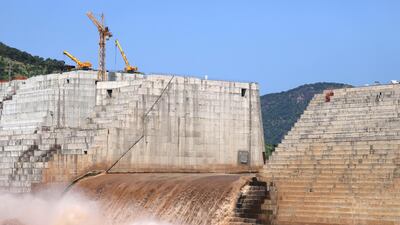With Ethiopia’s Grand Renaissance Dam nearly complete, Egypt has been left with limited options going forward after it failed to persuade the East African nation to offer concessions over their drawn-out negotiations about the dam’s impact on Egypt’s vital share of the Nile water, according to experts.
Cairo has declared negotiations with Addis Ababa over the issue deadlocked and is demanding that a foreign mediator joins the talks, whose latest round was held earlier this week in Khartoum, Sudan’s capital. Significantly, Ethiopia disagrees with that assessment and refuses to invite a mediator.
This is the third time since 2014 that Egypt has declared the negotiations deadlocked, something that underlines Cairo’s recurrent disappointment with how the talks have progressed. Sudan, like Egypt a downstream Nile nation, and Ethiopia say outstanding problems could still be resolved in future talks. Egypt has countered by saying all its proposals have been rejected by Ethiopia.
The dam is built on the Blue Nile, which accounts for about 85 per cent of the Nile waters, but only about 65 per cent of the water reaching Egypt. The Blue Nile and the White Nile, whose origins are in central Africa, meet near Khartoum to become the Nile that flows downstream through the deserts of northern Sudan and into Egypt all the way to the Mediterranean coast.
Two of the three experts who spoke separately to The National believe Egypt was unlikely to withdraw from future talks but will likely attend while it simultaneously lobbies the UN Security Council to look into the issue and adopt a binding resolution against Ethiopia’s handling of the impasse.
That approach, the experts say, is rooted in Egypt’s belief that Ethiopia’s tactics could pose a threat to peace in the region, an argument Cairo could support with a list of the expected damage it will suffer as a result of the dam.
The two experts – Hany Raslan of Egypt’s Al Ahram Center for Political and Strategic Studies and Cairo University’s geology and water resources professor Abbas Sharaky – believe that an Egyptian complaint to the Security Council would be hinged in large part on the contention that Ethiopia’s construction of the dam without prior consultations with Egypt violated treaties governing international rivers, as well as bilateral accords signed in the last century.
“Egypt should also pursue a legal course of action,” said Mr Raslan. “Withdrawing from a declaration of principles signed in 2015 between Egypt, Sudan and Ethiopia would be a good first step.”
The declaration implicitly acknowledged Ethiopia’s right to build the dam but, according to Mr Sharaky, it does not amount to a binding treaty.
Egypt, the most populous Arab state with 100 million people, is alarmed that the dam, scheduled to start operating next year, will significantly reduce its share of the Nile waters when a massive reservoir behind it is filled. Mostly desert and depending on the river for most of its water needs, Egypt has publicly acknowledged the dam’s importance to Ethiopia’s development but argues that bilateral cooperation could reduce to acceptable levels of the expected damage.
Egypt’s President Abdel Fattah El Sisi last month sought to internationalise the dispute before the UN General Assembly and later said his country would not accept a de facto situation regarding the dam.
He did not say what Egypt would do to prevent that, but the three experts who spoke to The National ruled out a military option because of the negative fallout from such a measure.
“Egypt has very little leverage on Ethiopia, which has very little incentive to accept mediation,” said Michael W. Hanna, a Middle East expert with New York’s Century Foundation. “Ethiopia thinks it’s entitled to more water, while Egypt may be vulnerable and without the tools to change realities and, moreover, there isn’t a military action by Egypt that won’t be catastrophic.”
Ethiopia has been emboldened by its increasing regional influence and buzzing economy. With a population matching Egypt’s, it views the hydropower dam as essential to its development. The dam has also become a symbol of national pride at a time when Ethiopians, like many in other Nile basin nations, feel Egypt has unjustifiably enjoyed the lion’s share of the Nile’s water – an annual 55 billion cubic metres – for far too long.
It’s in this context that Ethiopia has been less than flexible in the negotiations. It has rejected an Egyptian offer this year to invite World Bank experts to the negotiations and described as an “infringement of its sovereignty” Cairo’s suggestions on operating the dam and filling the reservoir.
Ethiopia says it could fill the reservoir in 2-3 years, but made a concession to Egypt by proposing a 4-7 year timeline. Cairo also has requested that Ethiopia annually releases 40 billion cubic metres of water, but Ethiopia rejected that on the grounds it could not spare so much water during years of drought.
“Egypt’s proposal is an effort to maintain a self-claimed colonial era-based allocation and veto power on any project in the Nile system,” Ethiopia’s foreign ministry said in an October 1 note.
“Rejecting mediation means you don’t want a solution,” said Mr Shakary, the Cairo University professor. “Ethiopia should offer Egypt a goodwill gesture of some kind to push the talks forward.”


